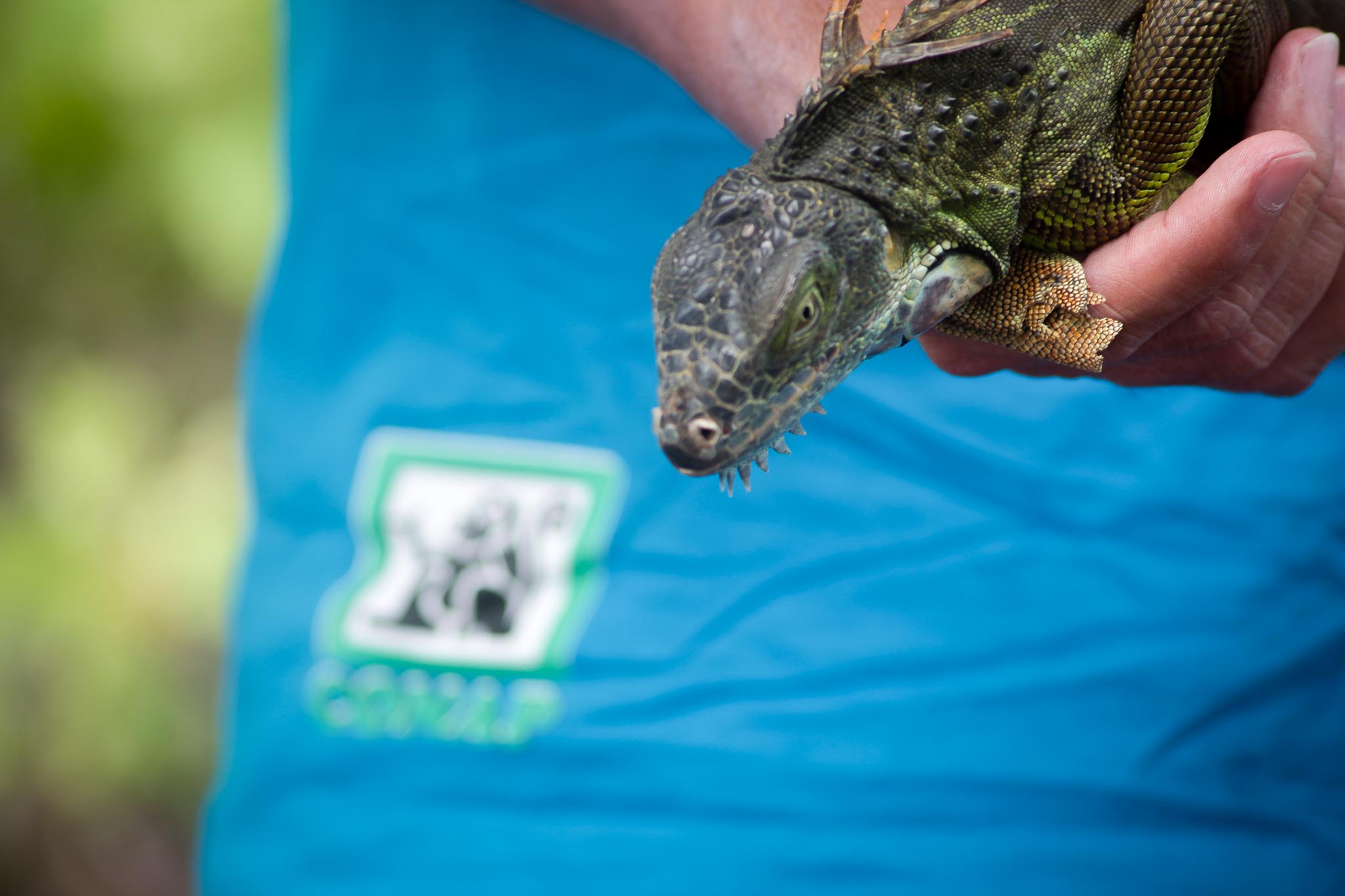Law initiative 6054, a proposal with a lot of controversy in Guatemala
Last March, a group of congress members from the governing party of president Alejandro Giammattei in Guatemala, presented Law Initiative 6054 which seeks among other things, that the Ministry of Environment and Natural Resources be in charge of managing all the actions that CONAP and INAB, two governments entities created with the sole purpose of protecting the country’s natural areas and resources, currently do.
If this initiative is approved, there is a risk of a massive loss of jobs in all Guatemalan environmental management, and it would generate uncertainty in the projects that are currently being executed.
Marlo Garcia is a citizen researcher whose life goal is to show the world that science is the best tool that humanity has, to learn to value and protect the natural environment that surrounds it. He is a bird watcher, with access to one of the greatest sources of biodiversity in Guatemala, Petén, in the north of the country.
It is there in Petén where the Mayan Biosphere Reserve (MBR) is located, the largest protected area in all of Central America. Home to jaguars, tapirs, toucans and macaws and some species of poisonous snakes, this reserve is, in turn, part of the great Mayan Forest, which is shared with Mexico and Belize, one of the five great forests of Central America.
Due to its biological importance, the MBR is the center of many projects, some financed by the Guatemalan government, most by the international community, all managed either by the National Institute of Forests (INAB) or by the National Council of Protected Areas (CONAP), entities that manage and facilitate processes for the development of the communities settled within the immense protected area.
It is, in part, thanks to this culture of conservation that Marlo and thousands of people, not only in Petén, but throughout Guatemala, have managed to get fully involved in the effort to protect natural life, while at the same time generate sustainable development processes that are of economic and social benefit to people.
“We worked with several communities where there was no information about the birds. We mainly involve young people starting to work and expressing an interest in tourism (as a source of income). We support them so that they can be birdwatching guides and this benefits us both: they have access to information that they did not have and we have data on birds in areas that we did not have before,” said García.
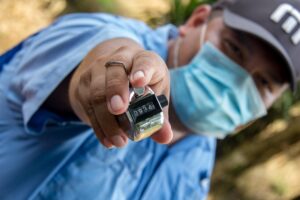
Marlo García, birder and promoter of citizen science in Petén, Guatemala. Photo: Jorge Rodriguez/Viatori
CONAP manages a wide variety of protected areas in the country, such as the aforementioned RBM, where concession contracts for community management of large areas of forest cover have recently been extended. INAB, for its part, manages the country’s forest resources, and this year alone it has encouraged the establishment, maintenance and sustainable management of 16,739 projects, directly and indirectly benefiting 25,893 families equivalent to 126,333.26 hectares.
These incentives are given to local communities, municipalities and private individuals who own territories with forest cover, with the aim of protecting them, either as conservation areas or as sustainable management zones, for the economic benefit of the country.
Both CONAP and INAB, and other offices dedicated to the management of environmental resources in Guatemala, carry out their work with barely 0.13% of the country’s GDP, and have managed, over some four decades, to create and sustain a series of programs aimed at to generate benefits to the population, from the care of natural resources.
Law Initiative 6054
At the beginning of his administration, in 2020, the Minister of the Environment and Natural Resources helped draft Law Initiative 6054, which seeks, among other things, to centralize all the work of these offices, together with the Office of Control of State Reserve Areas (OCRET) and the authorities of the accounts of the lakes: Amatitlán, Atitlán and the Río Dulce basin – Lake Izabal. and that everything be regulated and managed by the Guatemalan Ministry of Environment and Natural Resources.
The problem with this, and that generated an almost immediate rejection of all the environmental, technical, forestry and scientific sectors of Guatemala, because this initiative violates the principle of decentralization, promoted by the Constitution of the country.
“Far from seeking environmental sustainability, (this law) would seriously threaten the governance of nature inside and outside protected areas and natural heritage zones,” said opposition deputy Luis Fernando Pineda, who is also a member of the Environment Commission, Ecology and Natural Resources of the Congress of Guatemala, in charge of deciding whether the initiative is approved or not.
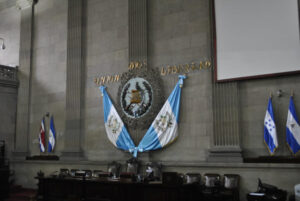
Guatemalan Congress. Photo: Red Ciudadana/Wikipedia
“Article 97 of the Constitution of the Republic establishes a shared responsibility of the inhabitants, the municipalities and all state entities in decision-making on environmental issues, because we are talking about the administration of territories and the governance of goods and services. ecosystems,” said Diana Monroy, a researcher associated with the Center for Conservation Studies.
According to the sectors against the approval of this bill, the risk that is run by centralizing all the work done by CONAP, INAB and the other offices is that all the dynamics created up to now, in which it has been Hard work with local communities is necessary to involve them in projects for the conservation and sustainable management of resources.
“Although I would like to believe that this initiative will benefit us, how can we believe in it if MARN has not had the experience? It seems that we are going through an unprecedented setback for the conservation of forests and protected areas, and in relation to incentives for reforestation or industrial activities,” said columnist and environmentalist Vida de Paz, in the local newspaper Prensa Libre.
Possible Consequences on Environmental Management in Guatemala
Another concern is the aura of corruption that surrounds the MARN, since it is an institution that is considered weak against crimes against the environment that national and international companies commit in the country.
Along these lines, the Chamber of Agriculture of Guatemala expressed, last April, its rejection of the possibility of centralizing the management of natural resources in a single institution, since it puts at risk all the previous work that has been carried out during the last decades throughout the country, the conventions and agreements that have been signed over the years and the money that exists, via donations and international loans, to carry out this work. “It seems that a mechanism of access and control over financial resources is being sought,” the Chamber said in a document.
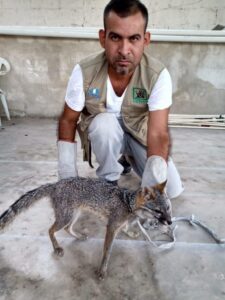
A CONAP forestry technician attends to a rescued female Coyote specimen in Quiché.
The justification of the speakers of this initiative, presented last March by several deputies of the ruling party, including Shirley Rivera, current president of the Legislative Body, is that there is “a lot of bureaucracy” and “little execution of actions aimed at public policy for the protection and conservation of the environment. This despite the fact that the number of protected areas, managed by CONAP, continues to increase, the country has declared 33% of its territory as protected, and the forestry incentive program, managed by INAB, has injected the local economy a total of $31 million (30,963,458.90), only so far in 2022, from forestry incentives.
The union of different sectors against this initiative suggests that it will not see the light of day, due to everything that is at stake. According to columnists Nicholas Virzi and Gonzalo Cabrera, the only thing this generates is “unnecessary wear and tear” for the current administration, and it can play against it in the face of the next electoral process. “The ruling party would do well to shelve and definitively withdraw this initiative. Any deputy who votes in favor of this initiative runs the risk of being left out of the next Congress,” they said.
Everyone has to keep going
Despite all this, in Guatemala, on a day-to-day basis, no matter what happens, everyday life will always feel the same. This is a land where violence, insecurity, extreme poverty, abuse and all that you read everywhere do not seem to affect the routine of its inhabitants.
Marlo, for her part, continues to cultivate her determination and dedication to bring knowledge to all the boys and girls of the different communities of Petén. During the pandemic, she actively moved together and is currently striving to create spaces for participation in the community of Uaxactún, another famous archaeological site, located 23 kilometers from Tikal. Her goal, as she has always been, is to help educate children, so that they have development opportunities based on the protection of their natural resources.
“I am convinced that, through citizen education and research, we will not only be able to value what we have, but I also know that we will be able to create development opportunities for the people of these regions,” he concluded.
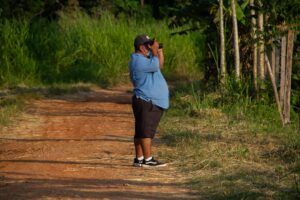
A CONAP forestry technician attends to a female Coyote specimen rescued in Quiché. Marlo García continues with her work to promote the care of natural resources. Photo: Jorge Rodriguez/Viatori
